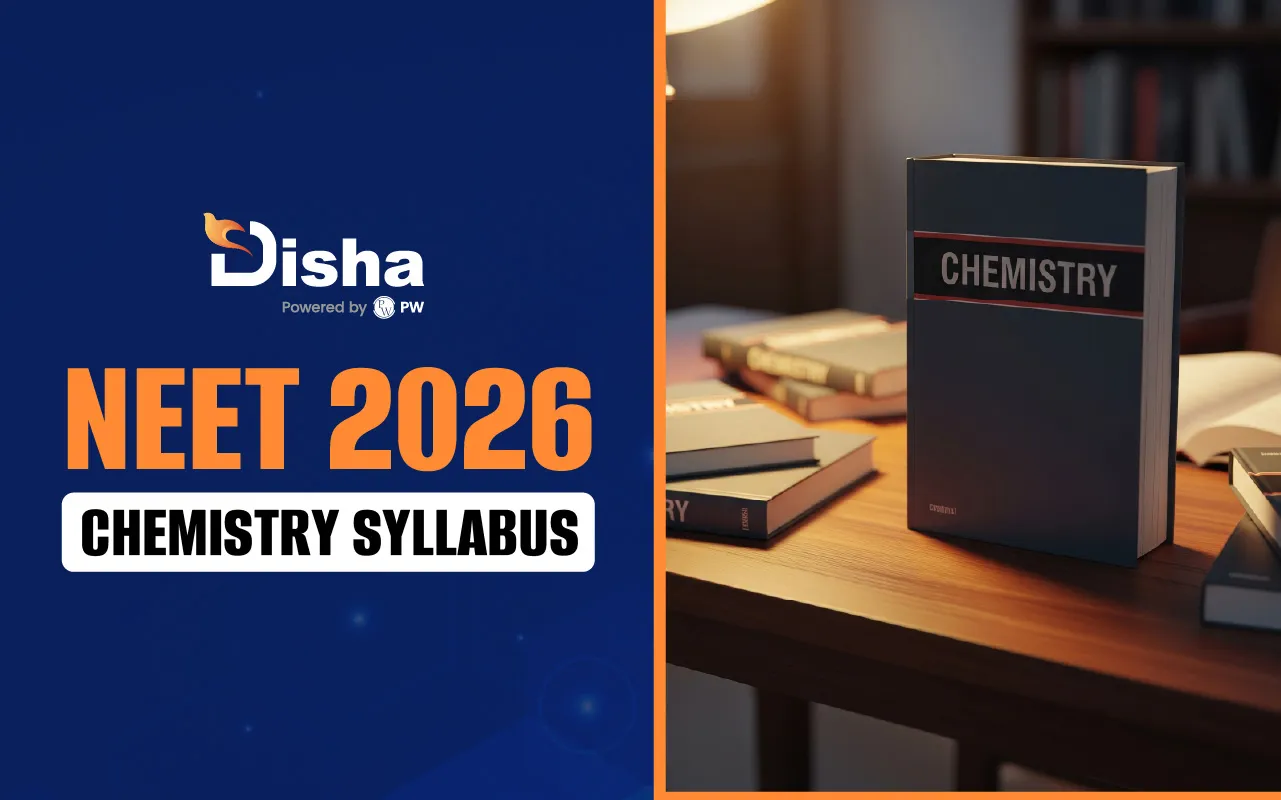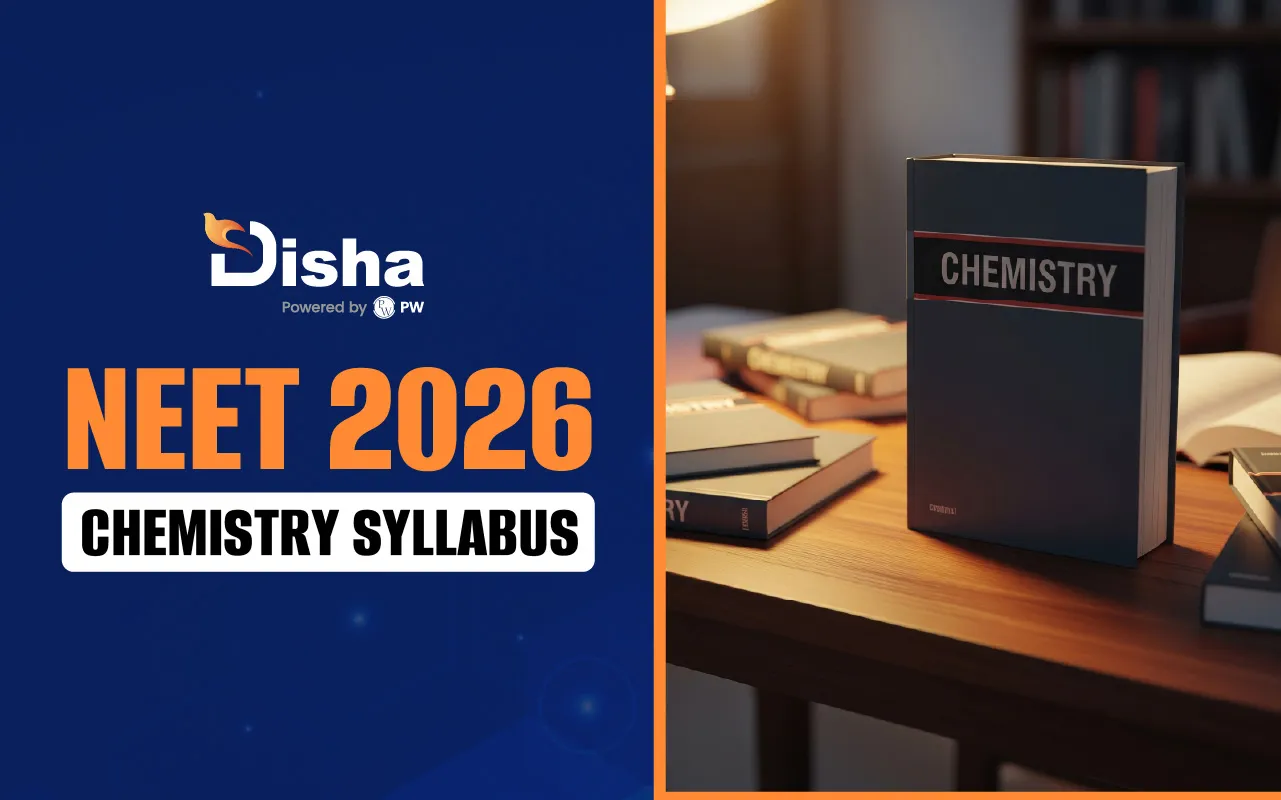

NEET 2026 Chemistry syllabus is divided into three main sections: Physical, Inorganic, and Organic Chemistry. Altogether, 20 chapters are covered in class 11 and 12 NCERT books, such as atomic structure, chemical bonding, hydrocarbons, etc. The focus of this syllabus provides a broader breadth of crucial concepts to which the medical aspirant should focus more attention.
NEET UG 2026 Chemistry Class 11 syllabus and Class 12 syllabus help students in studying in a more organized way. Chemistry subjects, especially thermodynamics, chemical kinetics, coordination compounds, biomolecules, etc., come under important topics. Following this pattern of the syllabus will definitely improve their time management and preparation for NEET 2026.
NEET 2026 Chemistry Syllabus Overview
NEET Chemistry Syllabus comprises a division into chapters from Class 11 and Class 12. In all, there are 20 chapters. These portions cover the important topics from both Class 11 and Class 12 NCERT textbooks, in exact conformance to the NEET UG 2026 Chemistry Class 11 syllabus and the NEET UG 2026 Chemistry Class 12 syllabus.
This clear division helps students plan their studies and prepares them effectively for the exam, ensuring they have prepared all the necessary chapters and subtopics.
|
NEET 2026 Chemistry Syllabus Overview |
|||
|
Chemistry Part |
Number of Chapters |
Class 11 Chapters |
Class 12 Chapters |
|
Physical Chemistry |
8 |
Some Basic Concepts, Atomic Structure, Chemical Bonding, Thermodynamics, Equilibrium, Redox Reactions |
Solutions, Electrochemistry, Chemical Kinetics, Surface Chemistry |
|
Inorganic Chemistry |
4 |
Periodic Table, P-block Elements, S-block Elements, Redox Reactions |
Coordination Compounds, D and F-Block Elements, Metallurgy, Qualitative Analysis |
|
Organic Chemistry |
8 |
Basic Principles, Hydrocarbons, Organic Compounds containing Halogens |
Aldehydes, Ketones, Carboxylic Acids, Alcohols, Phenols, Ethers, Amines, Biomolecules |
This distribution helps students organize their studies and prepare thoughtfully for the exam.
NEET 2026 Chemistry Syllabus: Chapter Wise
NEET Chemistry syllabus is divided into chapters from Class 11 and Class 12. In all, there are 20 chapters assigned. These are further categorized into Physical, Inorganic, and Organic Chemistry. The three groups contain a certain number of chapters that cover important topics a student needs to prepare for NEET 2026.
NEET 2026 Chemistry Syllabus: Physical Chemistry
Physical Chemistry covers 8 chapters of many core topics. It encompasses those aspects of atomic structure, chemical bonding, thermodynamics, and chemical equilibrium. These form the very base or skeleton on which chemical reactions and laws are based. Major chapters in Physical Chemistry include:
-
Some Basic Concepts in Chemistry: Concepts like atoms, molecules, mole concept, and stoichiometry.
-
Atomic Structure: Electrons, quantum theory, and atomic models.
-
Chemical Bonding and Molecular Structure: Ionic, covalent bonds, hybridization, molecular orbitals.
-
Thermodynamics: Laws of thermodynamics and enthalpy changes.
-
Solutions: Concentration, Raoult’s law, colligative properties.
-
Equilibrium: Chemical equilibrium, Le Chatelier’s principle, ionic equilibrium.
-
Redox Reactions and Electrochemistry: Oxidation-reduction, electrochemical cells.
-
Chemical Kinetics: Reaction rates, factors affecting rate, Arrhenius equation.
These chapters require focus on both theory and problem-solving for numerical-based questions.
NEET 2026 Chemistry Syllabus: Inorganic Chemistry
Inorganic Chemistry has 4 major chapters. These focus on elements and their properties, groups of elements, and coordination chemistry. This section is mostly theory-based, so regular revision is important. Main chapters include:
-
Classification of Elements and Periodicity in Properties.
-
P-block Elements (Group 13 to 18 elements).
-
D- and F-block Elements (Transition and Inner Transition elements).
-
Coordination Compounds: Ligands, bonding theories, and applications.
This part includes learning trends in elements, oxidation states, and uses of elements, important for the NEET exam.
NEET 2026 Chemistry Syllabus: Organic Chemistry
Organic chemistry makes up a crucial part of the course curriculum with 8 important chapters covering the study of carbon compounds and their reactions. Important topics will be:
-
Basic Principles of Organic Chemistry: Hybridization, functional groups, reaction mechanisms.
-
Hydrocarbons: Alkanes, alkenes, alkynes, aromatic compounds.
-
Organic Compounds containing Halogens, Oxygen, and Nitrogen.
-
Aldehydes, Ketones, and Carboxylic Acids.
-
Biomolecules include carbohydrates, proteins, vitamins, and nucleic acids.
-
Practical Organic Chemistry: Purification, detection of elements, and basic experiments.
Understanding reaction types, mechanisms, and naming compounds is crucial here. This section carries many questions in the NEET exam.
NEET 2026 Chemistry Syllabus Preparation Tips
Here are some tips for being well-prepared in the NEET 2026 Chemistry syllabus:
-
Start studying from class 11 and 12 NCERT textbooks, as the entire syllabus would be well-explained in those books.
-
Make short notes and formulas for quick revision.
-
Practise numerical questions daily, especially in Physical Chemistry.
-
Revise inorganic concepts regularly using tables and charts.
-
Learn organic reactions and mechanisms systematically.
-
Solve previous year NEET papers to understand question patterns.
-
Manage study time by focusing more on high-weightage chapters.
-
Take mock tests to improve speed and accuracy.
These tips will help you remain focused on the NEET 2026 Chemistry Syllabus and prepare well for the exam.
Why Choose PW Disha for NEET 2026 Preparation?
PW Disha is an online platform that facilitates one-on-one mentorship assistance for NEET aspirants. Here, students can share their doubts and receive rapid support through personal, one-to-one chats. It provides an array of useful features:
-
Every student gets a free first chat session of five minutes.
-
Students are connected with a mentor who can relate to their specific needs as a NEET.
-
Also, chat attachments are provided so that students can review their previous conversations anytime.
-
Students can check whether the mentor is online before initiating the chat.
-
After each session, students are asked to share feedback so the platform can keep improving.
NEET 2026 Chemistry Syllabus FAQs
What topics are included in the syllabus of NEET 2026 Chemistry?
NEET 2026 Chemistry Syllabus consists of the following topics from Physical, Inorganic, and Organic Chemistry from Class 11 and 12 NCERT Books. It encompasses a total of 20 chapters.
Where can I find the detailed NEET UG 2026 Chemistry syllabus?
The detailed syllabus of NEET UG 2026 Chemistry is mentioned on official education websites. It lists chapters with subtopics for Classes 11 and 12.
How do I prepare for the NEET Chemistry syllabus efficiently?
Stick to the NCERT books, practice questions, and revise inorganic tables. Learn organic reactions thoroughly for better preparation.
Are there separate chapters for Class 11 and Class 12 in NEET Chemistry syllabus?
Yes, the NEET Chemistry syllabus is divided into chapters for Class 11 and Class 12, covering separately physical, inorganic, and organic chemistry.
In the NEET Chemistry curriculum, which section contains the maximum number of questions?
Physical and organic chemistry usually carry more questions in the NEET exam, so prioritize accordingly for those subjects.
